七年级英语一般疑问句和特殊疑问句
英语一般问句和特殊问句的构成
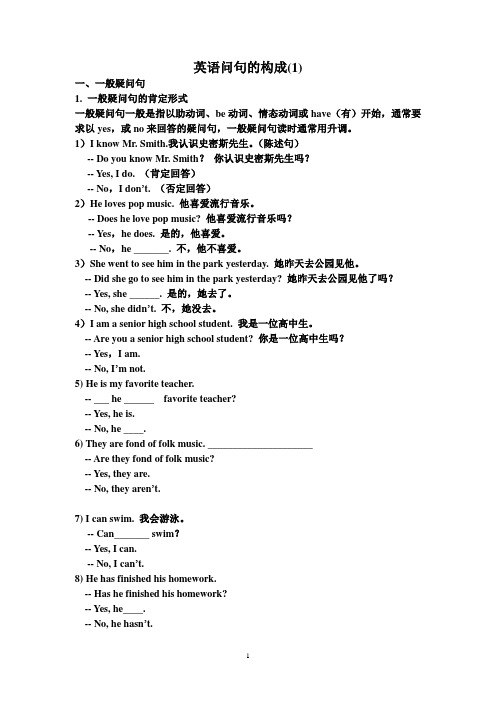
英语问句的构成(1)一、一般疑问句1. 一般疑问句的肯定形式一般疑问句一般是指以助动词、be动词、情态动词或have(有)开始,通常要求以yes,或no来回答的疑问句,一般疑问句读时通常用升调。
1)I know Mr. Smith.我认识史密斯先生。
(陈述句)-- Do you know Mr. Smith?你认识史密斯先生吗?-- Yes, I do. (肯定回答)-- No,I don’t. (否定回答)2)He loves pop music. 他喜爱流行音乐。
-- Does he love pop music? 他喜爱流行音乐吗?-- Yes,he does. 是的,他喜爱。
-- No,he _______. 不,他不喜爱。
3)She went to see him in the park yesterday. 她昨天去公园见他。
-- Did she go to see him in the park yesterday? 她昨天去公园见他了吗?-- Yes, she ______. 是的,她去了。
-- No, she didn’t. 不,她没去。
4)I am a senior high school student. 我是一位高中生。
-- Are you a senior high school student? 你是一位高中生吗?-- Yes,I am.-- No, I’m not.5) He is my favorite teacher.-- ___ he ______ favorite teacher?-- Yes, he is.-- No, he ____.6) They are fond of folk music. _____________________-- Are they fond of folk music?-- Yes, they are.-- No, they aren’t.7) I can swim. 我会游泳。
译林版2024新版七年级英语上册第05讲 一般疑问句 特殊疑问句和选择疑问句
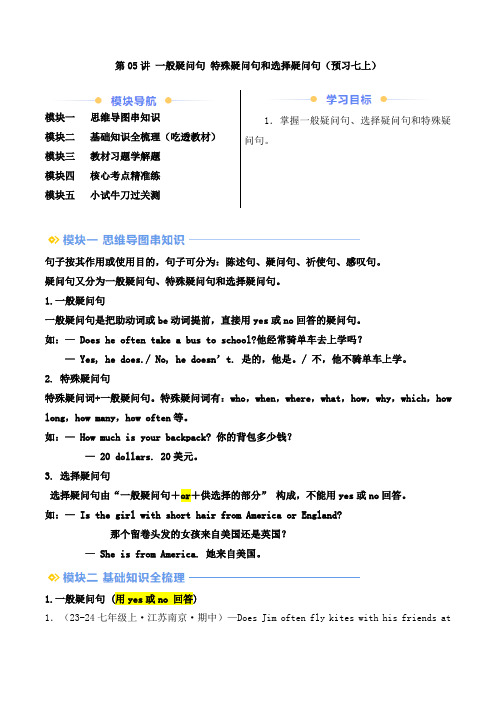
第05讲一般疑问句特殊疑问句和选择疑问句(预习七上)模块一思维导图串知识模块二基础知识全梳理(吃透教材)模块三教材习题学解题模块四核心考点精准练模块五小试牛刀过关测1.掌握一般疑问句、选择疑问句和特殊疑问句。
句子按其作用或使用目的,句子可分为:陈述句、疑问句、祈使句、感叹句。
疑问句又分为一般疑问句、特殊疑问句和选择疑问句。
1.一般疑问句一般疑问句是把助动词或be动词提前,直接用yes或no回答的疑问句。
如:— Does he often take a bus to school?他经常骑单车去上学吗?—Yes, he does./ No, he doesn’t. 是的,他是。
/ 不,他不骑单车上学。
2. 特殊疑问句特殊疑问词+一般疑问句。
特殊疑问词有:who,when,where,what,how,why,which,how long,how many,how often等。
如:— How much is your backpack? 你的背包多少钱?— 20 dollars. 20美元。
3. 选择疑问句选择疑问句由“一般疑问句+or+供选择的部分”构成,不能用yes或no回答。
如:— Is the girl with short hair from America or England?那个留卷头发的女孩来自美国还是英国?— She is from America. 她来自美国。
1.一般疑问句 (用yes或no 回答)1.(23-24七年级上·江苏南京·期中)—Does Jim often fly kites with his friends atweekends?—________. He likes flying kites very much.A.Yes, he is B.Yes, he does C.No, he doesn’t 2. 特殊疑问句(问什么答什么)2.(23-24七年级上·江苏盐城·期末)—________ woman is Daniel’s mother? —The one in the red coat.A.What B.Where C.Who D.Which3. 选择疑问句(选什么答什么)注意:不要错看成一般疑问句。
七年级上册英语1-3单元重点句型
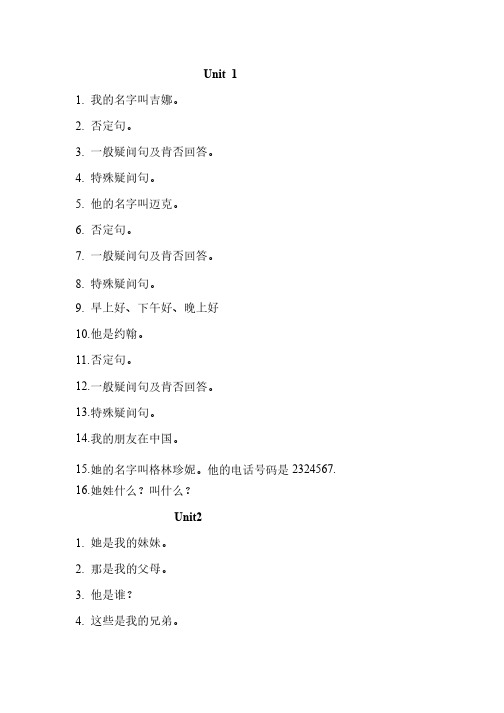
Unit 1 1.我的名字叫吉娜。
我的名字叫吉娜。
2.否定句。
否定句。
3.一般疑问句及肯否回答。
一般疑问句及肯否回答。
4.特殊疑问句。
特殊疑问句。
5.他的名字叫迈克。
他的名字叫迈克。
6.否定句。
否定句。
7.一般疑问句及肯否回答。
一般疑问句及肯否回答。
8.特殊疑问句。
特殊疑问句。
9.早上好、下午好、晚上好早上好、下午好、晚上好10.他是约翰。
是约翰。
11.否定句。
定句。
12.一般疑问句及肯否回答。
般疑问句及肯否回答。
13.特殊疑问句。
殊疑问句。
14.我的朋友在中国。
的朋友在中国。
15.她的名字叫格林珍妮。
他的电话号码是2324567. 16.她姓什么?叫什么?姓什么?叫什么?Unit2 1.她是我的妹妹。
她是我的妹妹。
2.那是我的父母。
那是我的父母。
3.他是谁?他是谁?4.这些是我的兄弟。
这些是我的兄弟。
5.他们是谁?他们是谁?6.介绍别人用_________________ 7.祝你有好的一天。
祝你有好的一天。
8.这是我的一张全家福。
这是我的一张全家福。
9.同义句。
同义句。
10.我的爷爷奶奶在第一张照片中。
这是我的父母,艾伦和玛丽。
下一幅照片里是我的兄弟,鲍勃和埃里克。
这两个女孩是我的妹妹辛迪和我的表妹海伦。
辛迪和我的表妹海伦。
11.C oco是我狗的名字。
是我狗的名字。
Unit 31. 人称代词主格名词性物主代词 人称代词主格 人称代词宾格形容词行物主代词 名词性物主代词人称代词宾格 形容词行物主代词我你、你们你、你们他她它我们我们他们他们2. 这是我的字典。
这是我的字典。
3.同义句同义句4. 这些是你的英语书吗?这些是你的英语书吗?5. 不,他们是鲍勃的。
不,他们是鲍勃的。
6. 这个蓝色的笔是她的。
这个蓝色的笔是她的。
7. 谢谢你的帮助。
谢谢你的帮助。
8.同义句。
同义句。
9.不用谢。
不用谢。
10. 买一本英语书怎么样?买一本英语书怎么样?11. 那些是你的钥匙吗?那些是你的钥匙吗?12. 这一串钥匙在桌子上。
人教版英语七年级上册一般疑问句和特殊疑问句

一般疑问句和特殊疑问句【概念引入】英语中的句子按照句式可以分为陈述句、疑问句、祈使句和感叹句。
一、陈述句用来说明事实或说话人的看法;分为肯定句和否定句。
例如:My name is Lily. 我的名字叫莉莉。
(肯定句)She isn’t a teacher. 她不是一个老师。
(否定句)二、祈使句用来表示请求、命令、劝告和建议等。
例如:Open the door please! 请打开门。
三、感叹句用来表达强烈的感情。
例如:What a beautiful girl she is!她真是个漂亮的女孩儿啊!四、疑问句用来提出问题。
例如:Are you my new teacher? 你是我的新老师吗?本节课,我们将重点讲解疑问句的用法。
【用法讲解】疑问句可以分为一般疑问句、特殊疑问句、选择疑问句和附加疑问句。
本册书中我们重点学习的是一般疑问句和特殊疑问句。
1.一般疑问句。
(1)什么是一般疑问句?可以用Yes或者No来回答的疑问句是一般疑问句。
一般疑问句读的时候往往要用升调;译成汉语的时候常可以译为“……吗?”。
例如:-Are you a student? 你是个学生吗?-Yes, I am. 是的,我是。
-Can you speak English? 你会说英语吗?-Yes, I can. 是的,我会。
-Do you go to school every day? 你每天都上学吗?-No, I don’t. 不,不是。
(2)如何将陈述句变成一般疑问句?①句中有be动词(am,is,are,was,were等)、助动词(do,does,did,have,had等)或情态动词(can,must,will,may等)时,将其提到句首,句末加上问号即可。
例如:She is a clever girl. 她是个聪明的女孩。
→Is she a clever girl? 她是个聪明的女孩吗?I can swim. 我会游泳。
人教部编版初中七年级语法一般疑问句和特殊疑问句总结
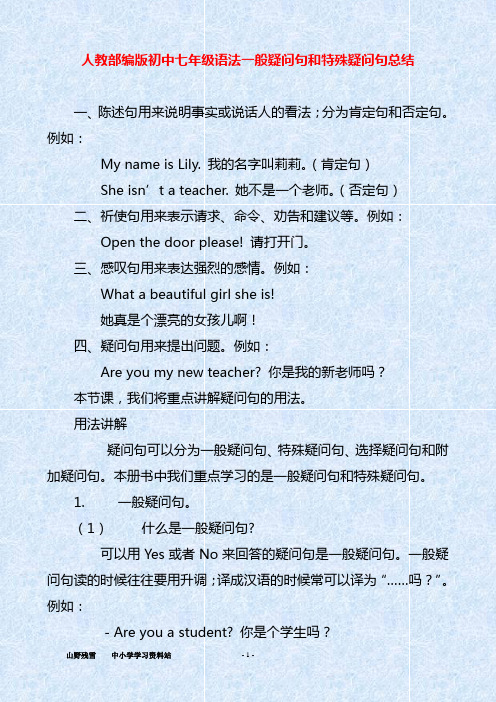
人教部编版初中七年级语法一般疑问句和特殊疑问句总结一、陈述句用来说明事实或说话人的看法;分为肯定句和否定句。
例如:My name is Lily. 我的名字叫莉莉。
(肯定句)She isn’t a teacher. 她不是一个老师。
(否定句)二、祈使句用来表示请求、命令、劝告和建议等。
例如:Open the door please! 请打开门。
三、感叹句用来表达强烈的感情。
例如:What a beautiful girl she is!她真是个漂亮的女孩儿啊!四、疑问句用来提出问题。
例如:Are you my new teacher? 你是我的新老师吗?本节课,我们将重点讲解疑问句的用法。
用法讲解疑问句可以分为一般疑问句、特殊疑问句、选择疑问句和附加疑问句。
本册书中我们重点学习的是一般疑问句和特殊疑问句。
1. 一般疑问句。
(1)什么是一般疑问句?可以用Yes或者No来回答的疑问句是一般疑问句。
一般疑问句读的时候往往要用升调;译成汉语的时候常可以译为“……吗?”。
例如:-Are you a student? 你是个学生吗?-Yes, I am. 是的,我是。
-Can you speak English? 你会说英语吗?-Yes, I can. 是的,我会。
-Do you go to school every day? 你每天都上学吗?-No, I don’t. 不,不是。
(2)如何将陈述句变成一般疑问句?①句中有be动词(am,is,are,was,were等)、助动词(do,does,did,have,had等)或情态动词(can,must,will,may等)时,将其提到句首,句末加上问号即可。
例如:he is a clever girl. 她是个聪明的女孩。
→Is she a clever girl? 她是个聪明的女孩吗?I can swim. 我会游泳。
→Can you swim? 你会游泳吗?②如果句中没有be动词、助动词或情态动词,则要根据不同的时态在句首加上相应的助动词来构成一般疑问句。
英语各种疑问句详细解释——_一般疑问句、特殊疑问句、选择疑问句、反意疑问句

各种疑问句的详细介绍疑问句(questions)指提出问题,请对方回答的句子。
疑问句句末要用问号。
按结构可分为四种:一般疑问句、特殊疑问句、选择疑问句、反意疑问句。
(一)一般疑问句1、一般疑问句概述一般疑问句(general questions),也可称为“yes/no” questions(是否型问句),因为它一般是由yes或no回答的,如:—Can you swim to the other side?你能游到对岸吗?—Yes, I can.是的,我能。
—No,I can’t.不,我不能。
—Have you locked the door?你锁门了吗?—Yes,I have.是的,锁了。
—No,I haven’t. 不,没有锁。
2一般疑问句的结构(1)基本的结构为:be/助动词/情态动词+主语+谓语/表语+(其他),句子要读升调,如:Are they your friends?他们是你的朋友吗?Does he go to school on foot?他是步行去上学吗?Will you be free tonight?你今晚有空吗?Can you play basketball?你会打篮球吗?(2)陈述句亦可用作一般疑问句,多用在非正式文体中,句末有问号,用升调,如:Somebody is with you?有人和你一起吗?He didn’t finish the work?他没有做完活吗?You are fresh from America,I suppose?我猜,你刚从美国回来吧?3、一般疑问句的答语(1)一般疑问句一般由yes或no来回答,如:—Are you tired?你累了吗?—Yes,I am.是的,累了。
—No, I’m not.不,不累。
—Does she do the cleaning?她扫除了吗?—Yes ,she does.是的,她打扫了。
—No,she doesn’t.不,她没打扫。
英语肯定句、否定句、一般疑问句和特殊疑问句的讲解与练习
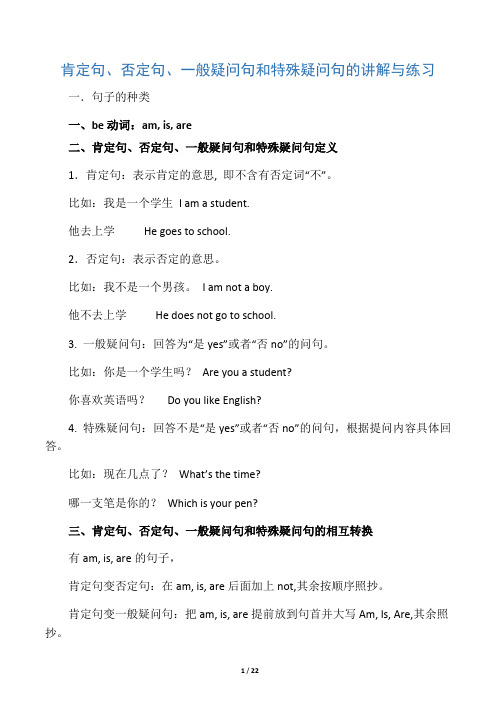
肯定句、否定句、一般疑问句和特殊疑问句的讲解与练习一.句子的种类一、be动词:am, is, are二、肯定句、否定句、一般疑问句和特殊疑问句定义1.肯定句:表示肯定的意思, 即不含有否定词“不”。
比如:我是一个学生I am a student.他去上学He goes to school.2.否定句:表示否定的意思。
比如:我不是一个男孩。
I am not a boy.他不去上学He does not go to school.3. 一般疑问句:回答为“是yes”或者“否no”的问句。
比如:你是一个学生吗?Are you a student?你喜欢英语吗?Do you like English?4. 特殊疑问句:回答不是“是yes”或者“否no”的问句,根据提问内容具体回答。
比如:现在几点了?What’s the time?哪一支笔是你的?Which is your pen?三、肯定句、否定句、一般疑问句和特殊疑问句的相互转换有am, is, are的句子,肯定句变否定句:在am, is, are后面加上not,其余按顺序照抄。
肯定句变一般疑问句:把am, is, are提前放到句首并大写Am, Is, Are,其余照抄。
肯定句变特殊疑问句(就划线部分提问):分3步骤第一步:先变一般疑问句。
第二步:找合适的特殊疑问词代替划线部分。
第三步:特殊疑问词提前放到句首,并大写,其余按顺序照抄,省略划线部分。
注意:1.一定先变一般疑问句。
但是,如果问的是主语或主语的定语时,语序不变,为"特殊疑问词(+主语)+陈述句"。
如:Liming 's not here today.Who's not here today? 今天谁没来?2.划线部分不能在特殊疑问句中出现。
例如:肯定句、否定句和一般疑问句的互换肯定句:This is a book.否定句:This is not a book.一般疑问句:Is this a book?肯定回答:Yes, it is.否定回答:No, it isn’t.就划线部分提问(变特殊疑问句)This is a book.第一步:变一般疑问句Is this a book?第二步:找合适的特殊疑问词Is this what ?第三步:特殊疑问词提前放到句首,并大写,其余按顺序照抄,省略划线部分。
七年级上_一般疑问句、特殊疑问句
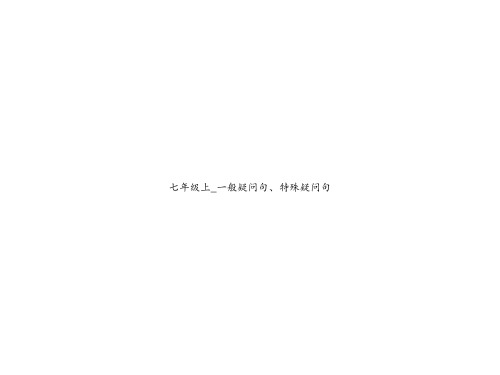
特殊疑问句(Special Questions)
• 特殊疑问句是以疑问词开头的问句, 其基本结构是“疑问词 + 一般疑 问句”,其答语不用yes或no, 而要 作具体回答。
eg: When do you have P.E.?
How…?
询问身体状况、方式方法等。 How is your mother?
How old…? 询问年龄。
How old is she?
When…? • 询问时间。什么时候。 When is your birthday? The basketball game is May 11th.
When is the basketball game?
如何把一般现在时态的陈述句变
为一般疑问句呢?
按词种类的不同将其分为两类:
一、含系动词be(am / is / are)或情 态动词(can 等)的一般现在时的句 子。
[秘诀]一调二改三问号
一调:即把be(am / is / are)或can等 词调到主语前;
二改:句中的主语若含有I(my / we) 等第一人称代词时,需将它们分别 改为you(your / you); 三问号:句末的句号改为问号。
二改:句首加助动词Does之后,谓语动词 必须改为原形,句中的主语为第一人称代 词时变化为第二人称;
三问号:句末的句号改为问号。
eg: She likes apples. Does she like apples? He has a sister. Does he have a sister?
将下列句子改为一般疑问句
What’s your favorite subject?
重点初中英语一般疑问句与特殊疑问句小结
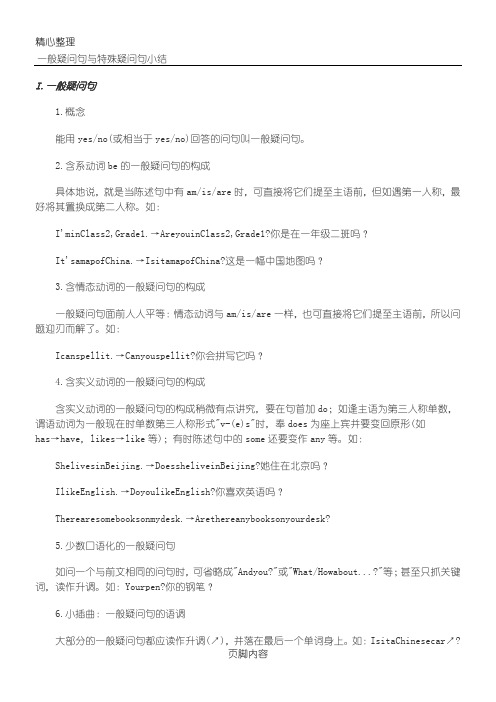
一般疑问句与特殊疑问句小结I.一般疑问句1.概念能用yes/no(或相当于yes/no)回答的问句叫一般疑问句。
2.含系动词be的一般疑问句的构成具体地说,就是当陈述句中有am/is/are时,可直接将它们提至主语前,但如遇第一人称,最好将其置换成第二人称。
如:It'samapofChina.→IsitamapofChina?3.含情态动词的一般疑问句的构成一般疑问句面前人人平等:情态动词与所以问题迎刃而解了。
如:4.do;如逢主语为第三人称单数,时,奉does为座上宾并要变回原形(如has→have还要变作any等。
如:她住在北京吗?Therearesomebooksonmydesk.→Arethereanybooksonyourdesk?5.少数口语化的一般疑问句如问一个与前文相同的问句时,可省略成"Andyou?"或"What/Howabout...?"等;甚至只抓关键词,读作升调。
如:Yourpen?你的钢笔?6.小插曲:一般疑问句的语调大部分的一般疑问句都应读作升调(↗),并落在最后一个单词身上。
如:IsitaChinesecar↗?7.一般疑问句的应答用yes/no(或相当于yes/no的词)回答,并怎么问怎么答(句首为情态动词am/is/are还是do/does),简略回答时要注意缩写(否定的n't)和采用相应的人称代词以避免重复:即"Yes,主语(代词)+情态动词或am/is/are或do/does."表示肯定;"No,主语(代词)+情态动词或am/is/are 或者do/doesnot(n't)."表示否定。
如:①-IsMaryaJapanesegirl?玛丽是日本女孩吗?-Yes,sheis./No,sheisn't.是的,她是。
/不,她不是。
②-CanLilyspeakChinese?-No,shecan't./Sorry,Idon'tknow.③-DoyoulikeEnglish?你喜欢英语吗?-Yes,verymuch.是的,非常喜欢。
一般疑问句和特殊疑问句的用法、结构、回答详细总结归纳

一般疑问句和特殊疑问句的结构、用法、回答详细总结讲解唐赳学英语,必须弄懂英语最基本的两种疑问句,即:一般疑问句和特殊疑问句。
一、一般疑问句一般疑问句是疑问句的一种。
它是指用yes(是)或no(不是)来回答的句子。
翻译成汉语,凡是句末都带有“吗?”的疑问句都是一般疑问句。
1、一般疑问句的总体基本结构:其结构是:系动词be / 助动词/情态动词+主语+其他成分+?如:Are you a student? 你是学生吗?2、一般疑问句的回答方式:肯定回答:Yes,主语+提问的be/助动词/情态动词.如上句:Are you a student? 你是学生吗?肯定回答就是:Yes, I am. 是的,我是。
否定回答:No,主语+提问的be / 助动词/ 情态动词的否定形式(not).如上句:Are you a student? 你是学生吗?否定回答就是:No, I am not.3、英语中的一般疑问句分为两种主要的形式:第一大类:为含有be动词(is am are,was, were)或情态动词的一般疑问句,其结构为:be+主语+其它部分+?情态动词+主语+动词原形+其它部分+?肯定回答用“Yes,主语+be \ 情态动词.”,否定回答用“No,主语+be \ 情态动词+not.”。
be或情态动词和not可用缩写形式,主要有isn’t,aren’t,wasn’t,weren’t,can’t,mustn’t,needn’t等。
例1:Is this your English book?这是你的英语书吗?肯定回答:Yes,it is. 是的,它是(我的)。
否定回答:No,it isn`t. 不,它不是(我的)。
例2:Are these your English books?这些是你的英语书吗?肯定回答:Yes,they are. 是的,它们是。
否定回答:No,they aren’t.不,它们不是。
例3: Can you speak English? 你能讲英语吗?(本句式含有情态动词can 的一般疑问句)肯定回答:Yes,I can. 是的,我能。
特殊疑问句和一般疑问句的用法
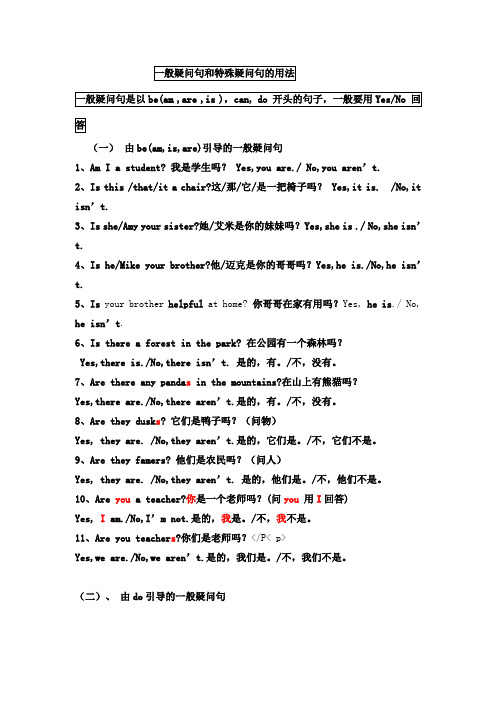
(一)由be(am,is,are)引导的一般疑问句1、Am I a student? 我是学生吗? Yes,you are./ No,you aren’t.2、Is this /that/it a chair?这/那/它/是一把椅子吗? Yes,it is. /No,it isn’t.3、Is she/Amy your sister?她/艾米是你的妹妹吗?Yes,she is ./ No,she isn’t.4、Is he/Mike your brother?他/迈克是你的哥哥吗?Yes,he is./No,he isn’t.5、Is your brother helpful at home? 你哥哥在家有用吗?Yes, he is./ No, he isn’t.6、Is there a forest in the park? 在公园有一个森林吗?Yes,there is./No,there isn’t. 是的,有。
/不,没有。
7、Are there any panda s in the mountains?在山上有熊猫吗?Yes,there are./No,there aren’t.是的,有。
/不,没有。
8、Are they dusk s? 它们是鸭子吗?(问物)Yes, they are. /No,they aren’t.是的,它们是。
/不,它们不是。
9、Are they famers? 他们是农民吗?(问人)Yes, they are. /No,they aren’t. 是的,他们是。
/不,他们不是。
10、Are you a teacher?你是一个老师吗?(问you 用I回答)Yes, I am./No,I’m not.是的,我是。
/不,我不是。
11、Are you teacher s?你们是老师吗?</P< p>Yes,we are./No,we aren’t.是的,我们是。
一般疑问句、特殊疑问句的构成形式及基本用法
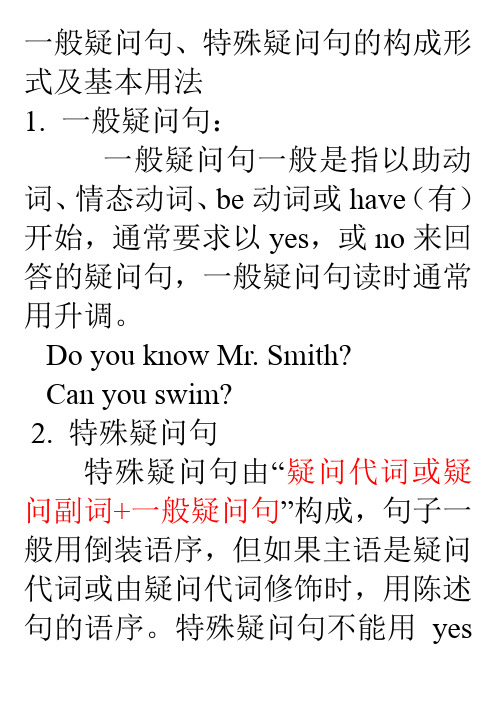
一般疑问句、特殊疑问句的构成形式及基本用法1. 一般疑问句:一般疑问句一般是指以助动词、情态动词、be动词或have(有)开始,通常要求以yes,或no来回答的疑问句,一般疑问句读时通常用升调。
Do you know Mr. Smith?Can you swim?2. 特殊疑问句特殊疑问句由“疑问代词或疑问副词+一般疑问句”构成,句子一般用倒装语序,但如果主语是疑问代词或由疑问代词修饰时,用陈述句的语序。
特殊疑问句不能用yes或no回答,读时用降调。
例如:Who is on duty today?How long have you been in Beijing? What time do you get up every morning?What must I do now?3. 注意疑问词的选择1. 问“谁”用who或whom。
如:Who is a doctor?Li Lei is a doctor.(对主语提问用who,对宾语提问用who,whom均可)2. 问“谁的”用whose。
如:Whose book is this?This is his book.3. 问“地点”用where。
如:Where is the ball?The ball is under the bed.4. 问“原因”用why。
如:Why didn't he come?He didn't come because he was ill.5. 问“身体状况”用how。
如:How are you?I'm fine.6. 问“方式”用how。
如:How did he do it?He did it in that way.7. 问“程度”用“how +被修饰语”。
如:How wide is the river?The river is five metres wide.8. 问“多少”用how much或how many。
一般疑问句和特殊疑问教案及练习

一般疑问句和特殊疑问句_讲解及练习一般疑问句一、什么是一般疑问句:用Yes或No作答的疑问句叫一般疑问句。
例:Do you like it? Yes, I do./ No, I don’t.Is this your mother? Yes, she is./ No, she isn’t.二、例何将陈述句变成一般疑问句?1.看句中有没有be动词(am、is、are、was、were)、助动词(do、does、did、have、had)或情态动词(can、must、will、may等),如果有,将其提到句首,句末打上问号即可。
例:It was rainy yesterday. →Was it rainy yesterday?Tom's father can play the piano. →Can Tom's father play the piano?I have finished my homework. →Have you finished your homework?2.如果句中没有be动词、助动词或情态动词,则根据谓语动词的形式借助do的相应形式放在句首。
具体方法是:如果谓语动词是原形,则借do;如果谓语动词是一般现在时第三人称单数形式,则借does;如果谓语动词是过去式,则借did. 需要注意的是,借does或did 后,原句的谓语动词要变回原形。
例:They go to school by bike. →Do they go to school by bike?Bill gets up at 6:30 every day. →Does bill gets up at 6:30 every day?The students saw a film yesterday. →Did the students see a film yesterday?三.陈述句变一般疑问句应注意的事项1.如果陈述句中有第一人称,则变问句时最好要变为第二人称。
七年级英语一般疑问句和特殊疑问句

26
◦把下列句子变成一般疑问句和 否定句 ◦1. I am listening to music. _______________________________________ ◦2 Tom likes listening to music ________________________________________ ◦3. I put a book on my head. ________________________________________ ◦4. There were some flowers in the vase. ◦(提示: wasn‘t, weren’t) ◦ ________________________________________
some改成any动词情态动词一般现在时在动词前加dont三人称单数前doesn?t一般过去式didnt加doesn?tdidnt的句子注意句子动词要变成原型
一般疑问句和特殊疑 问句
1
观察一下,这些肯定句 变成否定句的规律是怎 么样的?
2
◦be动词
3
◦肯定句: ◦They are in the park. ◦否定句: ◦ They are not in the park.
◦ ________________________________________
◦ 7.They should go to the concert?
◦ ________________________________________
28
◦1. We play basketball on Sundays. _________________________________
七年级英语一般疑问句和特殊疑问句练习题

七年级英语一般疑问句和特殊疑问句练习题1.What is the price of your nary。
It is 10 Yuan.2.How many subjects do you have。
I have seven subjects.3.Which subject do you like best。
I like math best.4.Why do you like science。
Because it's interesting.5.When does the girl do her homework?6.Does he want to go to a movie。
Yes。
he does.7.What kind of movies do you like。
I like comedies very much.8.How much are these bananas。
They are five dollars.9.Can we play football in the street。
No。
you mustn't。
It's dangerous.10.When does he play football。
XXX.1.Who is your father。
Does he still work as an engineer?2.How often does your father go to the XXX。
XXX.3.How soon will the XXX guests。
In three days.4.How far is it from the New Town to the old city centre。
Less than 30 minutes by underground.1.What is his favorite subject?2.Do they like broccoli?3.Why do you like thrillers?4.Is your book on the sofa。
初中英语一般疑问句与特殊疑问句小结

一般疑问句与特殊疑问句小结I. 一般疑问句1. 概念能用yes / no或相当于yes / no回答的问句叫一般疑问句;2. 含系动词be的一般疑问句的构成具体地说,就是当陈述句中有am /is / are时,可直接将它们提至主语前,但如遇第一人称,最好将其置换成第二人称;如:I'm in Class 2, Grade 1. →Are you in Class 2, Grade 1 你是在一年级二班吗It's a map of China. →Is it a map of China 这是一幅中国地图吗3. 含情态动词的一般疑问句的构成一般疑问句面前人人平等:情态动词与am / is / are一样,也可直接将它们提至主语前,所以问题迎刃而解了;如:I can spell it. →Can you spell it 你会拼写它吗4. 含实义动词的一般疑问句的构成含实义动词的一般疑问句的构成稍微有点讲究,要在句首加do;如逢主语为第三人称单数,谓语动词为一般现在时单数第三人称形式"v-es"时,奉does为座上宾并要变回原形如has→have,likes→like等;有时陈述句中的some还要变作any等;如:She lives in Beijing. →Does she live in Beijing 她住在北京吗I like English. →Do you like English 你喜欢英语吗There are some books on my desk.→Are there any books on your desk5. 少数口语化的一般疑问句如问一个与前文相同的问句时,可省略成"And you"或"What / How about..."等;甚至只抓关键词,读作升调;如:Your pen 你的钢笔6. 小插曲:一般疑问句的语调大部分的一般疑问句都应读作升调↗,并落在最后一个单词身上;如:Is it a Chinese car↗7. 一般疑问句的应答用yes / no或相当于yes / no的词回答,并怎么问怎么答句首为情态动词am / is / are还是do /does,简略回答时要注意缩写否定的n't和采用相应的人称代词以避免重复:即"Yes,主语代词+情态动词或am / is / are或do / does."表示肯定;"No,主语代词+情态动词或am / is / are或者do / does notn't."表示否定;如:① -Is Mary a Japanese girl 玛丽是日本女孩吗-Yes, she is. / No, she isn't. 是的,她是;/不,她不是;② -Can Lily speak Chinese 莉莉会说中国话吗-No, she can't. / Sorry, I don't know. 不,她不会;/对不起,我不知道;③ -Do you like English 你喜欢英语吗-Yes, very much. 是的,非常喜欢;II. 特殊疑问句1. 定义以特殊疑问词开头,对陈述句中的某一部分提出疑问 / 进行发问的句子叫特殊疑问句;2. 特殊疑问词全搜索一句话: wh-开头外加能与之结伴同行的名词; how及它的形容词兄弟姐妹们,即如: what, where, which, what class, what time, what number;how,how many, how old, how much等;3. 特殊疑问句的构成特殊疑问句由"特殊疑问词+一般疑问句"构成:How old are you 你多大了What's this in English 这个用英语怎么讲Who's not here today 今天谁没来Which pen is red 哪枝钢笔是红色的4. 特殊疑问句的语调一般说来,特殊疑问句都要读成降调↘,并往往让最后一个单词承担此重任;如:What row are you in↘ 你在第几排Where is"E" ↘ "E"在哪里5. 对特殊疑问句的答复回答特殊疑问句,不能用"yes / no";但可用"到什么山上唱什么歌"来形容对特殊疑问句的应答- -即问什么答什么尤其是简略回答更明显;如:-How old is your sister 你妹妹今年多大了-She's only five. / Only five. 她才5岁;III. 专项训练;1. 根据回答写出相应的问句一空一词;① -______ ______are the twins in -They are in Row 4.② -______is your father -Fine, thank you.③ -______Li Lei______8 -No, he is Number 6.④ -______6 plus three-It's 9.⑤ -______that, please -This is Mr Green.2. 按要求进行句型转换;①Mary is at home. 对划线部分提问②Eleven minu s six is five. 对划线部分提问③We're in the same class. 改成一般疑问句并作否定回答④My English teacher is Miss Hu.对划线部分提问⑤The twins are twelve now. 改成一般疑问句并作肯定回答一 ,把下列陈述句变成一般疑问句;1. Li Lei is at home today.2. I go to school on my bike.3. He can see a bird in the tree.4. There are some apples in the basket.二、把下列肯定句变成否定句;5. He is in a red sweater.He ______ in a red sweater.6. I can see some pictures on the wall in the classroom.I ______ ______ ______ pictures on the wall in the classroom.7. Colour it green, please.Please ______ ______ it green.8. Li Lei and his friends like to play in the tree house.Li Lei and his friends ______ ______ to play in the tree house.9. I think he is very old.I ______ ______ he is very old.三、对划线部分提问;1. Jill is fine. ______ is Jill2. My brother is in a black car. ______ ______ your brother3. The man in a black car is my brother.______ ______ is your brother4.The red shirt is Li Ming’s. ______ is the red shirt5. His coat is green. ______ ______ is his coat6. There is only one pen in her pencil-box.______ ______ ______ ______ there in her pencil-box四、同义句转化;1. A: His father is a teacher. His mother is a teacher, too.B: His ______ are both都 ______.2. A: Is she like her dadB: ______ she ______ like her dad3. A: What’s the timeB: ______ ______ ______ ______4. A: My shirt is blue. Is his shirt blue, tooB: My shirt is blue. ______ ______ ______5. A: It’s time for supper.B: It’s time ______ ______ supper.. 6. A: What other things can you see in the pictureB: What ______ can you see in the picture7. A: Let’s go and look at the bird in the tree.B: Let’s go and ______ ______ ____ at the bird in the tree.8. A: Please sit down. B: Please ______ ______ ______. 英语句型转换:主要涉及肯定句、否定句、一般疑问句的互换、祈使句的肯定和否定形式、单复数句型的转换、反意疑问句;1.I know the answer.一般疑问句______ ______ know the answer2.We can see some birds.一般疑问句______ ______ see ______ birds3.There is a computer in my house.一般疑问句______ ______ a computer in house4.There are s ome flowers on the teachers’desk.一般疑问句______ ______ ______ flowers on the teachers’desk5.There are some apples on the tree.否定式There ______ ______ ______ apples on the tree.6.I think he is very old.否定句I ______ think he ______ very old.7.Thank you for helping me.同义句Thank you for ______ ______ .8.There aren’t any pears in the box.同义句There are ______ pears in the box.9.Whose are these clothes同义句______ ______ are these1. They are elephants .变该句为单数形式2. We have two maths classes .改为一般疑问句3. There is a computer on the desk .改为一般疑问句4. There is some bread in the bag .改为一般疑问句5. I do project work in the club .变该句为复数形式6. There is some water in the bottle .否定句7. There are five elephants in the picture .单数8. Take him to the school .否定句Reading:1Too PoliteThere are many people in the bus. Some have seats, but some have to stand. At a bus stop, a woman gets on the bus. An old man hears the door and tries to stand up.“Oh, no, thank you,” the woman forces 强迫 him back to the seat. “Please don't do that. I can stand.”“But, madam, let me…,”says the man.“I ask you to keep your seat,” the woman says. She puts her hands on the old man's shoulder.But the man still tries to stand up,“Madam, will you please let me…”“Oh, no,”says the woman. She again forces the man back.At last the old man shouts, “I wants to get off the bus”1.All the people have seats in the bus.2.An old man gets on the bus at a bus stop.3.The old man wants to give his seat to he woman.4.The woman sits the old man's seat.5.The old man wants to get off the bus.2Most people who work in the office have a boss. So do I . But my boss is a little unusual. What's unusual about himIt's a big dog. Many men have dogs, but few men bring their dogs to the office every day. My boss's dog. Robinson, is big and brown. My boss brings him to work every day. He takes the dog to meetings and he takes the dog to lunch. When there is telephone call for my boss, I always know if he is in the office. I only look under his desk. If I see something brown and hairy 毛绒绒的 under it, I know my boss is somewhere in the office. If there is no dog , I know my boss is out.6. People _________bring dogs to the office.A. usuallyB. oftenC. seldomD. sometimes7. My boss is Robinson's ________.A. bossB. masterC. classmateD. teacher8. Robinson goes to meetings _________ my boss.A. forB. withoutC. instead ofD. with9. Robinson is always under the desk if the boss is _________.A. in the officeB. at meetingsC. out of the officeD. out of work10. The passage tells us the boss _________ the dog very much.A. looks likeB. hatesC. likesD. trust。
- 1、下载文档前请自行甄别文档内容的完整性,平台不提供额外的编辑、内容补充、找答案等附加服务。
- 2、"仅部分预览"的文档,不可在线预览部分如存在完整性等问题,可反馈申请退款(可完整预览的文档不适用该条件!)。
- 3、如文档侵犯您的权益,请联系客服反馈,我们会尽快为您处理(人工客服工作时间:9:00-18:30)。
把下列句子改成否定句和一般疑问句
1. The children have a good time in the park.
否定句: _______________________ 一般疑问句: _______________________
2. There are about nine hundred people at the concert.(音乐会) 否定句:_________________________________ 一般疑问句:_____________________________ 对划线部分提问:__________________________
5. I read an English book every day. 否定句: ________________________________________ 一般疑问句: ________________________________________ 肯定/否定回答: ________________________________________ 对划线部分提问: ________________________________________
Yes, she is. No, she isn’t.
They are helpful. Are they helpful?
Yes, they are. No, they aren’t.
2. 句子中如果有情态动词( can, should, will… ),直接把情态动词提前。 注意:第一人称和第二人称互换。
(4)“主语+及物动词+间接宾语+直接宾语”,间接宾语是人, 直接宾语是物。 能接双宾语的动词多数要在间接宾语前加to或for。 ①加to的动词有 give, send, pass, take, bring, show, lend, sell等。 She sent me a present.=She sent a present to me. 她寄给了我一份礼物。 ②加for的动词有 buy, make, build, mend, cook等。 My father bought me a bike.=My father bought a bike for me. 我爸爸给我买了一辆自行车。 (5)“主语+及物动词+宾语+宾语补足语” The teacher asked the students to listen carefully in class. 老师要求学生上课认真听讲。
2、how often
指每隔多久,主要用来对频度副词(如: alway, usually, often, sometimes, never 等)或状语(如:once a week, three times a month 等)提问。 A:How often does he come here? 他(每隔)多久来一次? B:Once a month. 每月一次。
(1). 表示多长时间,主要用来对一段时间(如three days, four weeks 等)提问。 如: A:How long did he stay here? 他在这儿呆了多久? B:About two weeks. 大约两个星期。 (2). 表示某东西有多长。 A:How long is the river? 这条河有多长? B:About 500 km. 大约500千米。
句型讲解
一般疑问句 特殊疑问句
2020. 04. 29 优怡教育:谭老师
目录
CONTENTS
01 中考要求 02 陈述句 03 一般疑问句 04 特殊疑问句 05 随堂练习
中考要求
1.了解句子成分。 2.掌握以下简单句型的基本用法。 1)主语+系动词+表语 2)主语+不及物动词 3)主语+及物动词+宾语 4)主语+及物动词+间接宾语+直接宾语 5)主语+及物动词+宾语+宾语补足语 6)there be句型 3.掌握陈述句的构成和基本用法。 4.掌握一般疑问句、特殊疑问句的构成和基本用法。
陈述句
陈述句是用于陈述一个事实或表达说话人的看法的句子。陈述句主要分 为肯定句和否定句。 1.陈述句的肯定句式主要有五种基本句型 (1)“主语+系动词+表语” I am honored. 我很荣幸。 (2)“主语+不及物动词” The students work very hard. 学生们学习很努力。 (3)“主语+及物动词+宾语” I teach English. 我教英语。
for+一段时间 频率 in+一段时间
三、how far表示“多远”对距离的提问
A:How far is your home from school? 你家离学校有多远? B:My house is three miles from school. 我家里学校有三英里
变特殊疑问句分为三步: 1.确定特殊疑问词 2.再变一般疑问句 3.谁划线,谁消失
2. 无be动词/情态动词,在句首加Do/Does/Did,其余照抄,(some改成any,第一人 称变为第二人称my改成your , I 改成you, we 改成you, our改成your )句末用问号。
3. 加Does、did 的句子注意,句子动词要变成原型。
特殊疑问句(一般来说,句尾读降调)
2.陈述句的否定句式 (1)be动词+not (2)情态动词/助动词+not+动词原形 I don't get up at six o'clock this morning. 今天早上六点我没有起床。 (3)no, never, hardly, seldom, few, little, nobody, neither…nor, none 等词构成否定句。 I can hardly believe his story. 我几乎不相信他的故事。 (4)think, believe, suppose 等词的否定前移的用法。 (5)“too…to…”句型本身具有否定的含义。 She is too young to go to school. 她太小,还不能去上学。
He did his homework in the classroom yesterday.
He did his homework in the classroom yesterday.
He did his homework in the classroom yesterday.
对画线部分提问,除了要注意选择正确的疑问词外,还要注意语序的运用。
以wh-和how开头的疑问词, 问什么答什么。 一般情况下特殊疑问句基本构成:特殊疑问词+一般疑问句 what, who, which, when, where, why, whose, how what time, what color… how old, how long, how many, how much, how big, how far
4. Ann does her homework every evening. 否定句: ____________________________________ 一般疑问句: ____________________________________ 对划线部分提问: ____________________________________
I can swim.
He should work hard
Can you swim?
Yes, I can. No, I can’t.
Should he work hard?
Yes, he should. No, he shouldn’t.
肯定句改一般疑问句的方法——三步法
1. 有be动词/情态动词:be动词/情态动词提到句首,其余照抄, (some改成any,第一人称变为第二人称my改成your , I 改成you, we 改成you, our改is in the park now. 否定句:____________________________ 一般疑问句:________________________ 肯定/否定回答:_____________________ 对划线部分提问:____ _______________
How的疑问句辨析 一、how many和how much的区别
how many用来询问可数名词的数量,它的句式是: How many+复数名词+一般疑问句+? how much用来询问不可数名词的数量,也可询问价格。
二、how long, how often, how soon的区别
1、how long 有以下两个主要意思:
3. There is only one problem. 否定句: ________________________________________ 一般疑问句: ________________________________________ 肯定/否定回答: ________________________________________
1、 对句子的主语提问,其语序是:疑问词+be动词/情态动词/助动词+主语+其 他成分?(整个句子是陈述句语序) She is their teacher. Who is their teacher?
2、对句子主语的定语部分提问,其语序是: 疑问词+主语(即定语所修饰的名词)+ 谓语+其他成分?(整个句子是陈述句 语序) My book is over there. Whose book is over there ?
一般疑问句(一般读升调)
(一)什么是一般疑问句 用yes或no回答的疑问句叫作一般疑问句。 (二)一般疑问句特征 以be(am, is are)动词,情态动词(can, should, will…)以及以 助动词(do, does)开头的疑问句。注意:通常读升调 1. Is he a student? 2. Can you swim? 3. Do you like apples?
